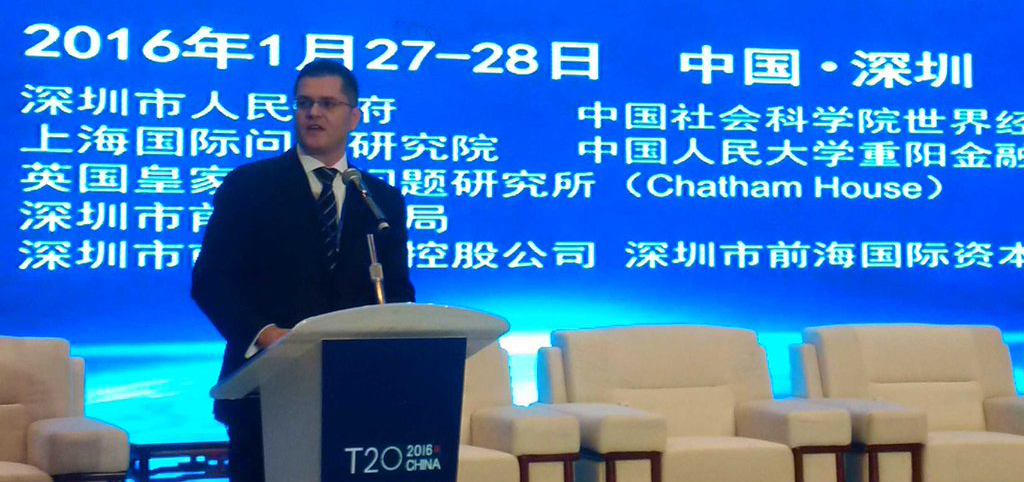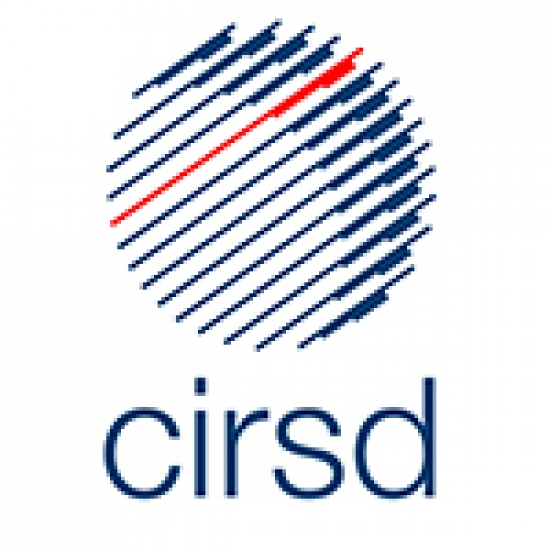CIRSD President Vuk Jeremic gave the keynote speech at the opening ceremony of the inaugural conference of think-tanks affiliated with the G20 meeting under the auspices of China’s 2016 presidency.

Held in the southern city of Shenzhen, famous for having launched China’s historic ‘reform and opening up’ policy, the invitation-only T20 International Finance Forum brought together renowned academicians, international bankers, policy experts, and scholars under the theme of “global financial governance and innovation.”
The T20 forum was hosted by the Institute of World Economics and Politics of the Chinese Academy of Social Sciences, the Chongyang Institute for Financial Studies of Renmin University, and the Shanghai Institute for International Studies, in collaboration with Chatham House.
In his opening address, Mr. Jeremic spoke of the “pervasive global uncertainty” he observed at last week’s World Economic Forum in Davos, arguing that overcoming it requires “an honest evaluation of existing international financial institutions and regional developments banks, as well as a constructive framework to engender cooperation between them and the more recently established ones—the Asia Infrastructure Investment Bank, for example. And it requires that we face our global responsibilities squarely—by committing to a more robust and inclusive 21st-century multilateralism, […] at the heart of which should stand the United Nations.” Jeremic concluded by expressing the need for closer cooperation between the G20 and the UN in the years to come through a “strong and deepening partnership” that could help forge a “much-needed consensus on critical issues.”
Some of these issues were covered in-depth during the conference. These included the state of the international monetary system and reform; the governance and reform of multilateral development banks; financial regulatory and trade reform; financial innovation and the innovative economy; and the role of the G20 in global economic governance. Featured speakers included the president of the Peterson Institute for International Economics Adam Posen; Yu Yongding, a full member of the Chinese Academy of Social Sciences; Sergey Drobyshevsku, the managing director of Russia’s G20 Expert Council; the vice president of the Asian Development Bank Zhang Wencai; the Head of World Economy and Development Finance at the German Development Institute Peter Wolff; the former president of China Merchant Bank Ma Weihua; and Zhang Yuyan, the director of the Institute of World Economics and Politics of the Chinese Academy of Social Sciences.
Accompanying Mr. Jeremic was CIRSD Senior Fellow and Horizons Editor Mr. Damjan Krnjevic Miskovic.

Opening Remarks to the
T20 International Policy Forum
Under China’s 2016 Presidency of the G20
“Global Financial Governance and Innovation”
by H.E. Mr. Vuk Jeremić
President of the Center for International Relations and Sustainable Development
(CIRSD)
WuZhou Guesthouse, Shenzhen
27 January 2016
Dear Friends,
It is a great honor to join you today for the inaugural high-level think-tank conference held under the auspices of the Chinese presidency of the G20.
At the onset of my remarks, I would like to express my sincere appreciation to the organizers for the opportunity to address such a distinguished audience, as well as for their exceptional hospitality here in Shenzhen.
____
China presides over the G20 at a critical moment.
At last week’s Davos World Economic Forum, many were of the view that the global fabric is becoming increasingly stretched. An inconclusive decade of strife in various corners of the globe, coupled with listless economic growth, has created a sense that we live in what one participant called a “difficult world.”
The global erosion of confidence is coming from multiple directions: climate change; increased inequality within and between states; a rise of investment risk around the planet; cybercrime; pandemics; hydrocarbon price fluctuations; terror attacks; further embitterments of sectarian divides; renewed ascendancy of ethnic and tribal grievances; and, perhaps most conspicuously—at least for my part of the world—a severe refugee crisis that is undermining the very pillars of the European project.
These are but some of the features that are causing developed and developing alike to be uncertain about their future living standards; and about whether key stakeholders will have the strength to join hands in shaping strategic responses to the shared challenges in the time ahead.
Ladies and Gentlemen,
I believe the solution to this pervasive global uncertainty cannot lie in securing one’s particular advantage with ancient zero-sum attitudes to the conduct of international relations.
Rather, it requires a win-win approach, like the one behind the ‘One Belt, One Road’ initiative. This endeavor could fundamentally transform the economics of globalization in the 21st century.
It also requires an honest evaluation of existing international financial institutions and regional developments banks, as well as a constructive framework to engender cooperation between them and the more recently established ones—the Asia Infrastructure Investment Bank, for example.
And it requires that we face our global responsibilities squarely—by committing to a more robust and inclusive 21st-century multilateralism.
Ladies and Gentlemen,
Two recent historic successes point to what can be achieved when statesmen come together in common cause: the UN 2030 Agenda for Sustainable Development and the Paris climate accords.
Global endeavors such as these can sustain no opt outs. They require a concerted approach by states—each bearing a commensurate share of the common planetary burden—and in particular by groupings such as the G20.
____
At the center of a more robust and inclusive 21st-century multilateralism, however, should stand the United Nations—the only international institution endowed with indisputable legitimacy to implement agreements on behalf of all sovereign states.
Yet, in the view of many, the UN is coming close to no longer being fit for purpose.
We hear more and more voices saying that the Organization has not kept up with modern times; that it has failed to modernize and adapt; and that its incremental approach to change has diminished its effectiveness.
They are telling us that the world is changing at a faster pace than the United Nations; and that the UN is going to be hard-pressed to engage far more actively in the years to come with all stakeholders—from every corner of the globe—on a whole host of issues.
As the G20 shifts from a mechanism of crisis response to one of long-term, strategic economic governance, it will continue addressing the important economic challenges faced by its members. Invariably, these will have world-wide implications, and, in one way or another, shape the political, economic, social, and environmental trajectories of the international community as a whole.
But as it keeps evolving, I believe the G20 should seek to work more closely with the United Nations in forging a much-needed consensus on critical issues.
Ladies and Gentlemen,
When I became President of the 67th Session of the United Nations General Assembly in 2012, no UN resolution had ever even referenced the G20. So strong was the opposition. For many governments, the G20 was perceived as an exclusive club, where conclusions were reached in non-transparent and unaccountable ways. Its structure and membership criteria, it was said, left out a vast majority of countries—excluding entire geographies.
But during my tenure in New York, we managed to formalize the regular interaction between the G20 and the rest of the world. We reaffirmed the preeminence of the UN as the venue for all countries—G20 and non-G20 alike—to reflect on common financial and economic concerns, share information, make proposals, and engage with the presiding G20 Sherpa in an interactive dialogue. We also agreed to hold high-level thematic debates reflective of G20 priorities, as well as to require the Secretary-General to report more fully on the UN’s engagement with the group.
The historic resolution that we adopted during the UN’s 67th Session laid the foundation for greater transparency and coherence. It also strengthened mutual understanding and cooperation in global governance matters.
Our initiative has, hopefully, contributed to changing the way many non-G20 countries see the G20: as a more inclusive mechanism for dialogue that at its founding was able to act quickly and decisively to forestall a global breakdown in finance and trade.
____
Today, the G20 is focused on strengthening the ongoing recovery—on making global growth sustainable and more balanced to the benefit of not only its members, but the entire international community.
Instead of defending the pre-2008 status quo, the G20 has chosen to engage in a far-reaching and serious debate on reform. The T20—designed as a repository for new ideas and proposals and to provide further continuity between presidencies—has helped lead the way in these forward-looking discussions.
I expect that, in the years to come, these and other critical issues will be discussed not only amongst G20 members, but also in a strong and deepening partnership with the United Nations—in view of the imperative that inherently global problems require inherently global solutions.
In so doing, we shall come to stand at the forefront of efforts to forge a true community of shared interests and responsibilities; bear confidently upon the strategic trajectory of humanity’s development; and attend to the transformation of the planet into a more peaceful, thriving, and sustainable place to live and dream for the generations to come.
Thank you very much for your attention.











